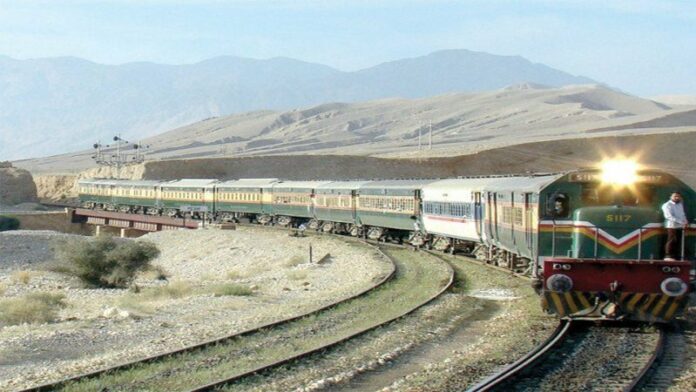—1,059km railway line to be laid from Havelian in KP to Kashghar in Chinese province of Xinjiang
—Railway network to be extended in Afghanistan to Kabul, Mazar-e-Sharif
ISLAMABAD: The ambitious plan of connecting Pakistan’s railway network from China and Afghanistan to Gwadar deep sea port under China Pakistan Economic Corridor (CPEC) has been declared strategically important by both Pakistan and China.
The plan will help commercially viable transportation of goods from China and Central Asian States to the port city, besides boosting trade and tourism activities in the country.
The already agreed CPEC project for up-gradation of existing Main Line 1 (ML-1) railway track from Peshawar to Karachi will be materialised in the first phase, followed by new railway lines that would be laid across the country to boost trade activities under CPEC.
According to the plan, a new 1,059 kilometer railway line from Havelian in Pakistan’s province of Khyber Pakhtunkhwa (KP) to Kashghar in Chinese province of Xinjiang would be laid to connect both the countries through railways.
Another 1,328 kilometer long new railway line from Jacobabad and Quetta via Basima to Gwadar has also been planned to be constructed at a cost of $4.5 billion to connect the port city with the rest of the country and China. Similarly, Pakistan Railways also plans to lay a new 560km railway track from Quetta to Kotla Jam on ML-2 via Zhob and DI Khan.
A new railway line from Peshawar to Torkham in Afghanistan is also part of the plan, however, in a fresh development, a source in the ministry of planning and development said that the railway network would be extended deep in the country to Kabul, and then to Mazar-e-Sharif, so that the Central Asian states could be connected via railway line with Gwadar.
All these new railway projects have been put in the long-term plan of CPEC which is supposed to be completed by 2030. “In order to effectively eventuate ML-1 project, it has been decided to break the project into three packages,” an official in the railways ministry said.
The ministry of railways has already submitted the PC-1 of Package-1 to the Planning Commission.
“Keeping in view the importance of the project, Prime Minister Imran Khan has directed the authorities concerned to start work on the project as early as possible. Therefore, the PC-1 of first package of the project is expected to be considered by the Central Development Working Party (CDWP) later this month which would refer to the Executive Committee of National Economic Council (ECNEC) for final approval,” an official in planning ministry said.
He further said that once approved by the ECNEC, this project would be presented before the 9th annual meeting of Joint Coordination Committee (JCC) on CPEC between Pakistan and China to be held in October this year for finalising financing modalities.
The scope of work includes up gradation and doubling of ML-1 from Karachi to Peshawar and Taxila to Havelian (1,872km) including provision of modern signaling and telecommunication systems, conversion of level crossings into underpasses/flyovers and fencing of the track.
CPEC project leader in Ministry of Railways Basharat Waheed said that on completion of ML-1, Pakistan Railways will reap the advantages of increase in speed from 65-105 km/hour to 120-160 km/h, increase in line capacity from 34 to 171 trains each way per day, increase in freight volumes from 6 to 35 million tons per annum by 2025, increase in passenger trains (ex-Karachi) from 20 to 40 each way per day and increase in railway share of freight transport volume from less than 4% to 20%.
Journey time from Karachi to Lahore will be reduced from existing 18 hours to only 10 hours while that from Islamabad to Lahore will be reduced from four-and-a-half hours to two-and-a-half hours, he added.
He said that the financing for the project would be arranged through a loan by the government of China. Share of Chinese loan and Pakistani government’s investment would be 85pc and 15pc respectively.
The loan will be granted on favourable terms at the rate of 2pc with a grace period of 8-10 years. As per the business plan, the loan will be paid back in 20 years, after completion of the project, from railways’ earnings.
Meanwhile, according to official documents available with APP, the project will create around 20,000 direct jobs for local people while it will also create over 150,000 indirect jobs in the country.





[…] railway network to be extended to Gwadar, Kashgar under CPECByAPP–August 18, 2019045—1,059km railway line to be laid from Havelian in KP to Kashghar in Chinese province of […]